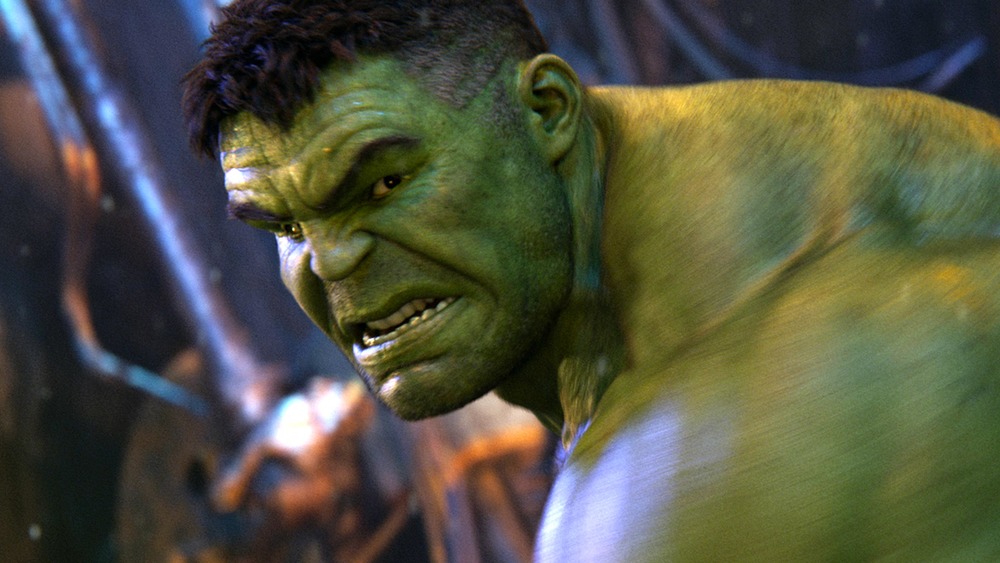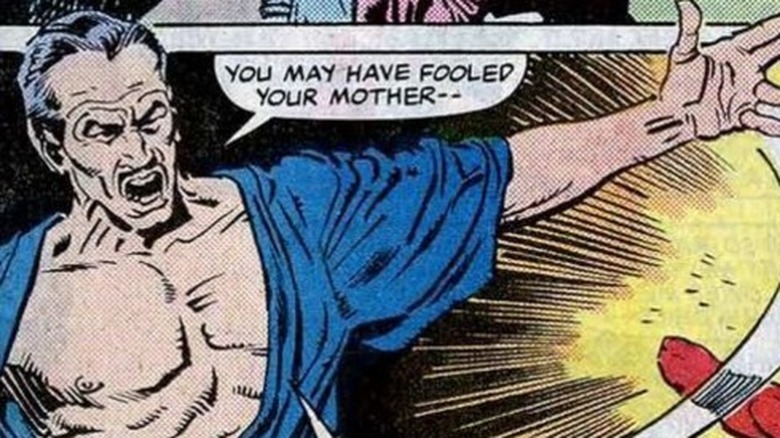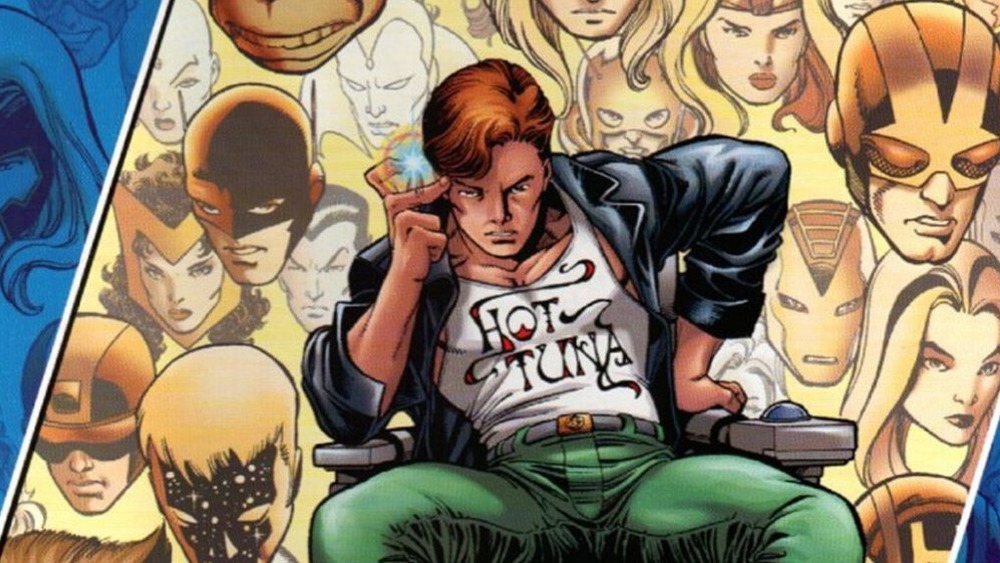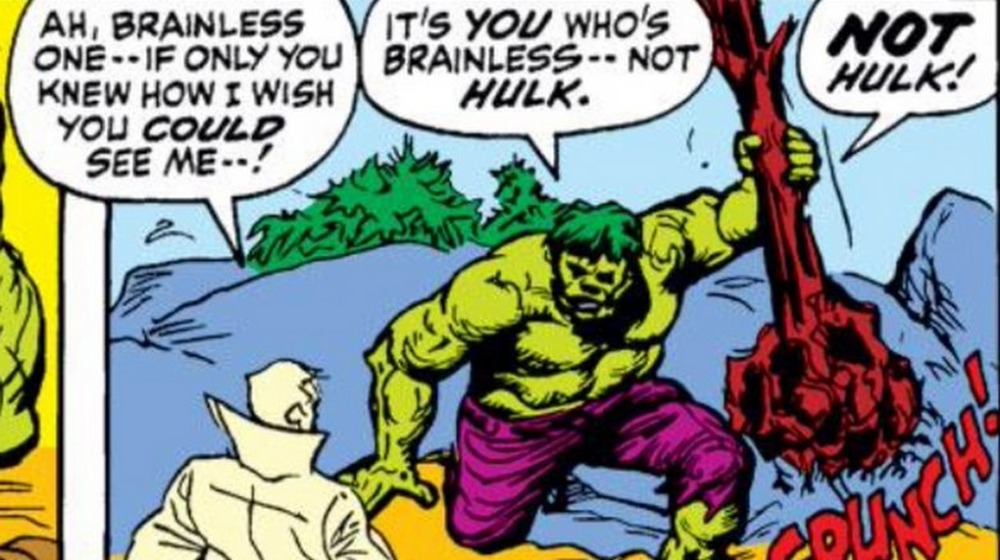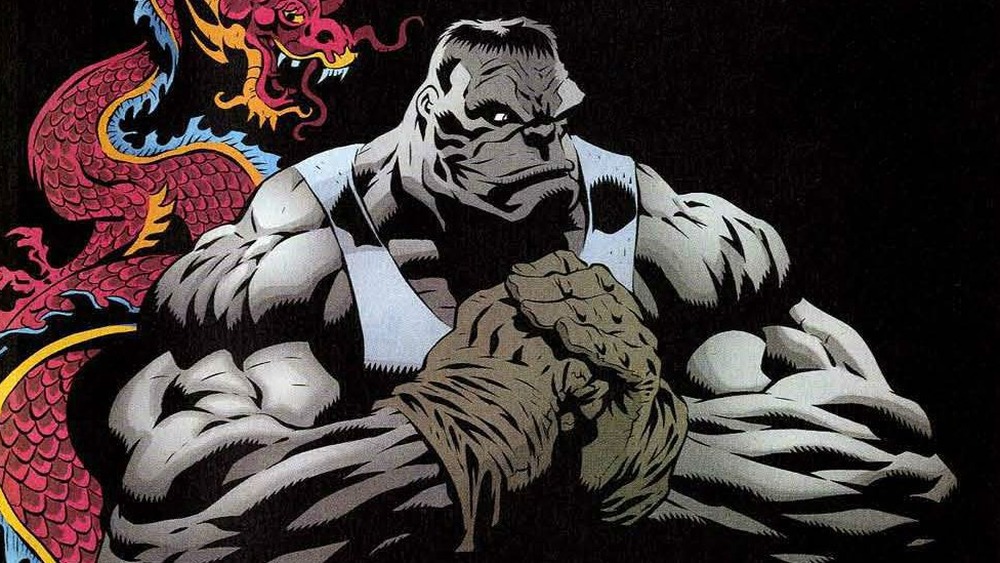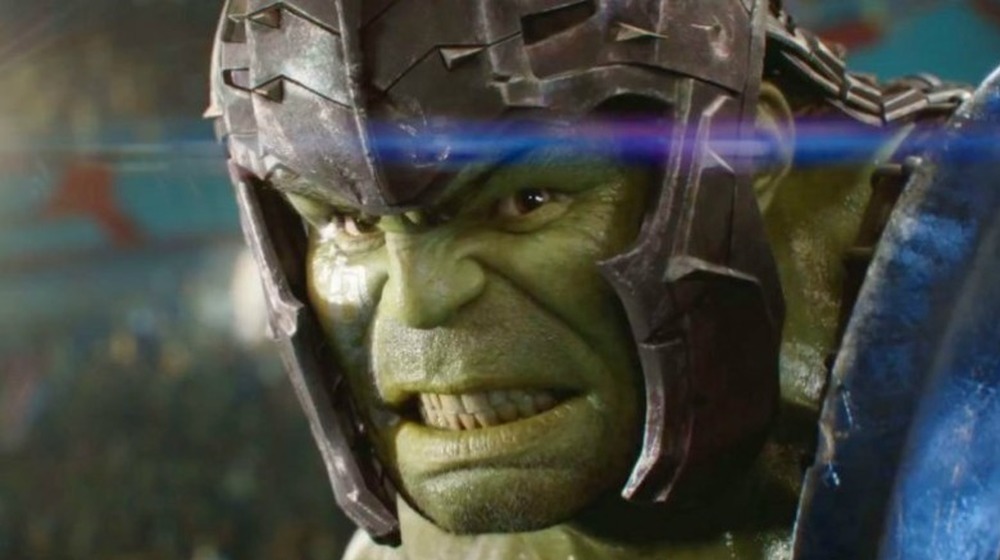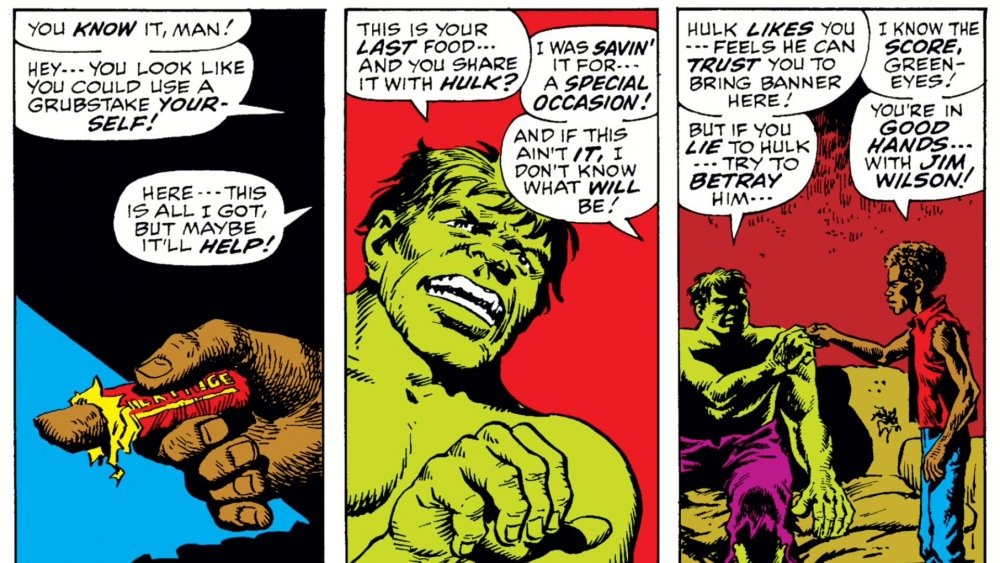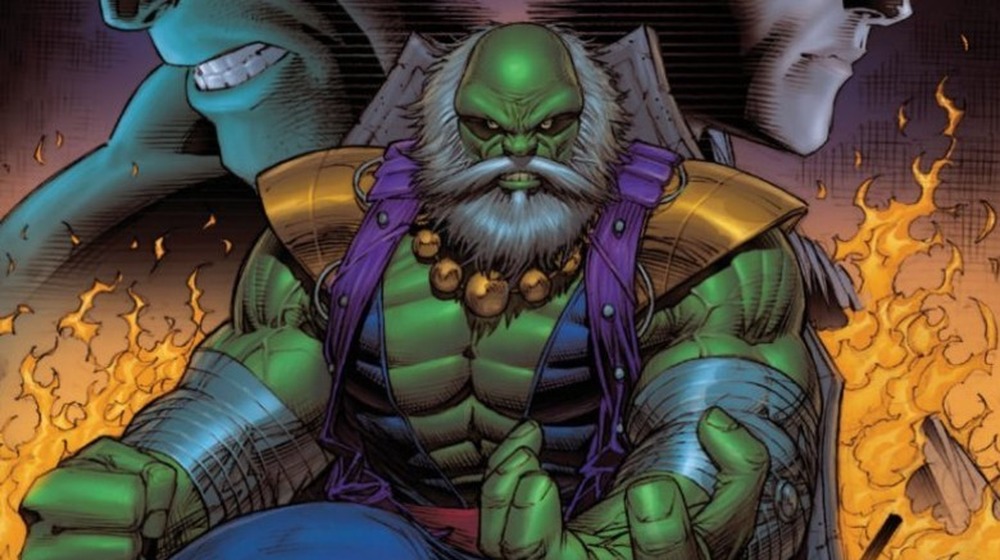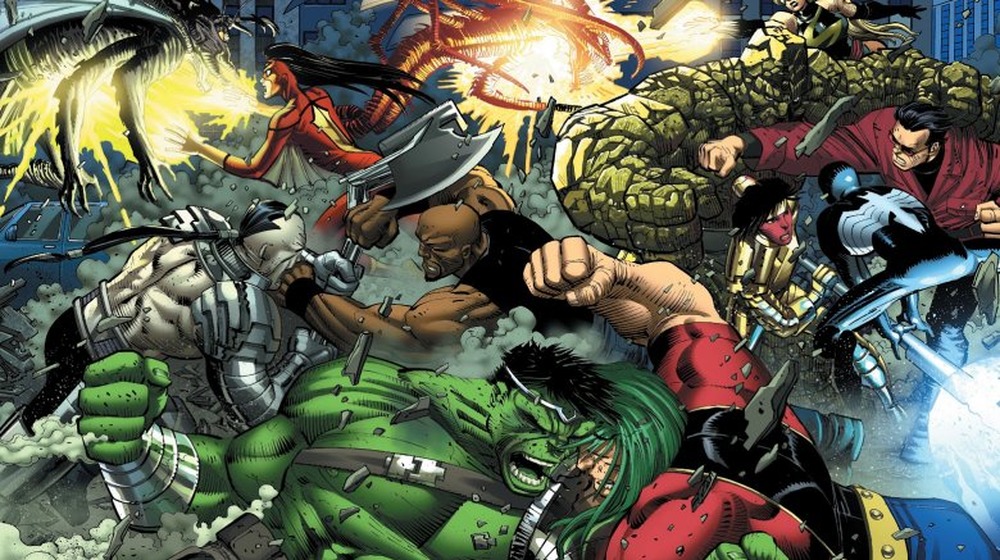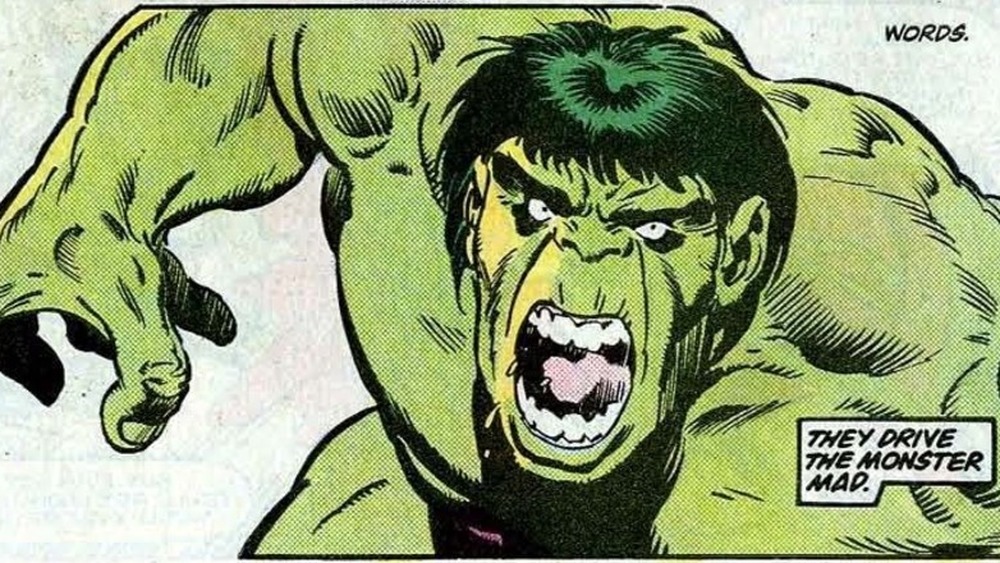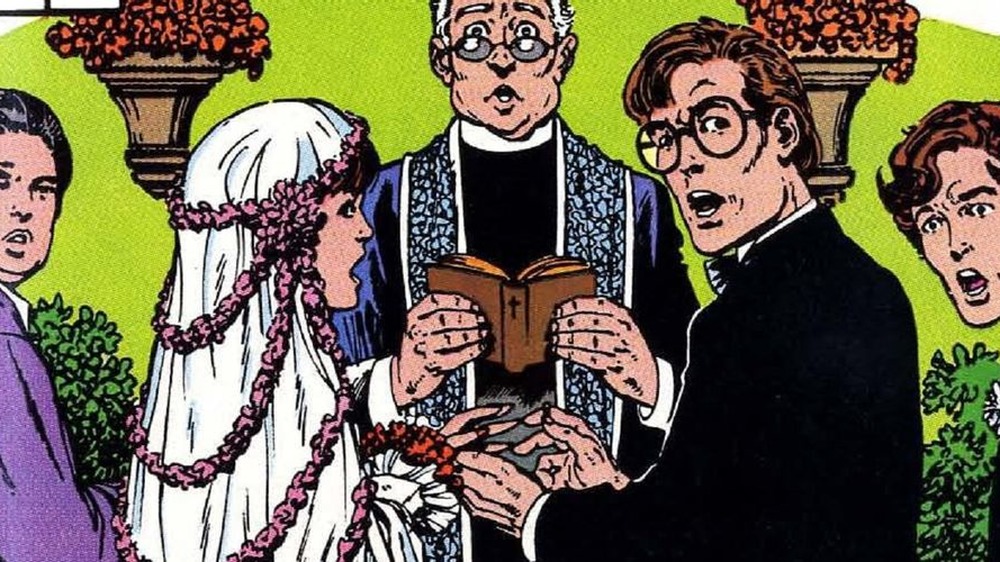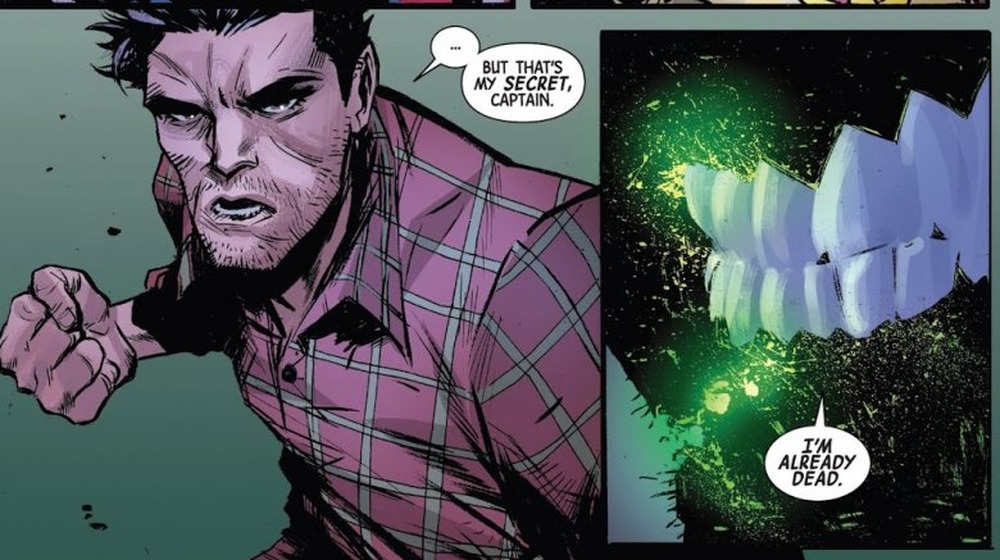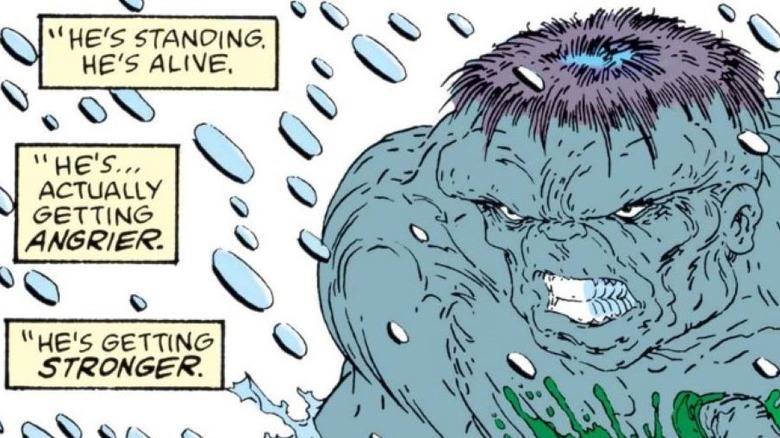Things About The Hulk That Didn't Make It Into The MCU
As faithful as they may be to the source material, no comic book movie is going to be able to get everything onto the big screen. Names will be changed, origins will be altered, and various fandoms will either find acceptance or be enraged. This is especially true in the case of Marvel's Incredible Hulk. The man-monster that the late Stan Lee called "Earth's mightiest mortal" has been around for over half a century, and the nature of his stories makes it practically impossible to include everything in adaptations.
Seriously, as much as changing times and shifting trends necessitate that all of the marquee superheroes adapt, few Marvel or DC characters have been reinvented and reinterpreted as much as the Hulk. From his powers to his skin color to the manner in which he transforms back and forth between Hulk and Bruce Banner, the hero's entire status quo seems to change dramatically once a new writer takes over, and Marvel Studios would have to work overtime to fit all of those versions of the green (sometimes) guy on the big screen. And that's not mentioning all the stories about the character that could never make it to the movies.
We couldn't possibly get to them all, but here are many of the things about the Hulk that didn't make it into the MCU.
The abuse Bruce Banner suffered as a child
Many of the most interesting interpretations of the Hulk lead back to 1985's Incredible Hulk #312. Written by Bill Mantlo with art by Gerry Talaoc and Hellboy creator Mike Mignola, the issue reveals the Hulk has been with Bruce Banner since he was a child. Most of the issue is a flashback featuring untold chapters of Banner's life. We learn that Bruce's father, Brian Banner, regularly lashed out at Bruce and his mother with verbal and physical abuse, ultimately beating his wife to death in front of their son. The implication here is that when Banner is exposed to gamma radiation in 1962's Incredible Hulk #1, the radiation doesn't create the Hulk so much as it gives physical form to a being who already lived within Bruce. Later, Hulk writers built upon this idea, particularly Peter David, who would use it to explain how so many different versions of the Hulk could live within Banner.
That Bruce Banner was abused as a child and that his trauma created the Hulk's personality is never touched upon in the MCU. The closest the films get is Mark Ruffalo's now iconic line toward the end of The Avengers: "I'm always angry." We never learn why he's always angry. In fact, in a deleted scene for 2017's Thor: Ragnarok, Banner shares an anecdote about regretting missing his father's funeral — a sentiment that would be bizarre in the comics, considering in 1997's Incredible Hulk #-1, it's revealed that it was Bruce who killed his father.
The Hulk's first sidekick, Rick Jones
During the origin montage of 2008's The Incredible Hulk, the name "Jones, Richard" is listed under Bruce Banner's known associates on a printout. That's the closest Hulk's earliest comic book sidekick has come to showing up in the MCU. In the comics, Jones shoulders some of the responsibility for Banner's transformation into the Hulk. When Jones trespasses on the gamma bomb test site on a dare, Bruce Banner races to save him ... when he's subsequently belted by gamma rays. Jones is the first person to know that Banner and Hulk are the same person and the first to do his best to protect his friend.
Because of the nature of Jones' history, should he ever show up in the MCU, it might not necessarily even have anything to do with Bruce Banner. Jones has become the catch-all Marvel sidekick. Along with the Hulk, Jones has acted as sidekick to Captain America, the spaceknight Rom, and two different versions of Captain Marvel. He's an Avenger — and was instrumental in forming the team back in 1963's Avengers #1 — and has played important roles in memorable Avengers events like "Kree-Skrull War" and Avengers Forever.
The Hulk can see more than most
One of the Hulk's lesser-known gifts is his ability to see spirits. In 1971's Marvel Feature #1, when he's first forming the Defenders, Doctor Strange sends his astral form to locate the Hulk. When he finds the man-monster, Strange says he wishes the Hulk could see him, only to learn the Hulk can see and hear him.
During Peter David's 12-year run writing Incredible Hulk, he expanded upon this idea of Hulk seeing astral forms and revealed he could also see ghosts. In fact, in 1997's Incredible Hulk #456, when the Hulk makes the surprising decision to submit to the experiments of the mutant villain Apocalypse and become his Horseman of War, the reason he gives in to Apocalypse is to shut up the ghost of his father Brian Banner, who's been harassing him.
The Hulk has a number of interesting abilities related to extra perception that we've never seen in the movies. For example, in the 2000-2001 mini-series Sentry, it's revealed the Hulk is one of the only creatures on Earth who remembers the superhero Sentry, even though his existence has been wiped from the minds of the rest of the world.
Joe Fixit
The Hulk was gray in his first comic book appearance, and his skin color was changed to green in Incredible Hulk #2. Later, in 1986's Incredible Hulk #324, writer/artist Al Milgrom brought the gray Hulk back to the Marvel Universe, and the writer who followed Milgrom — Peter David — used this new/old version of the character to spin gold. The gray Hulk isn't quite as strong as the green version, but he's smarter and a lot sneakier. For much of his time, Banner changes to the gray Hulk at night rather than out of anger. Because of a fan-favorite run that sees the gray Hulk become a leg-breaker for a casino owner in Las Vegas, this version of the Hulk became known as Joe Fixit — the alias he uses in "the Gambling Capital of the World."
We almost saw a gray Hulk in the MCU. The Hulk who fights Iron Man in 2015's Avengers: Age of Ultron was originally going to be gray, but plans changed. Even if that Hulk had been gray, it would've been nothing like Joe Fixit. The Joe Fixit Hulk isn't the type to go on that kind of rampage. If Scarlet Witch caused Joe Fixit to emerge, he would've found some dark, seedy corner of Johannesburg to hide out in. He would've fought to keep Banner from re-emerging and done whatever he could to stop the Avengers from ever bothering him again.
The best parts of Planet Hulk
Thor: Ragnarok included some wonderful tributes to the epic story "Planet Hulk." A chunk of the film takes place on the planet of Sakaar, and just like in the comic, Hulk is a famous gladiator in the planet's arena. We meet some characters from "Planet Hulk" – most notably the rocky alien Korg and the insect alien Miek — and the native Sakaarans show up as soldiers working for both Ronan and Thanos in 2014's Guardians of the Galaxy and 2019's Avengers: Endgame.
But as anyone who's read the story will tell you, there's so much more to "Planet Hulk." In the comic, the Hulk isn't a pampered gladiator, but instead, he's fighting for his freedom alongside his Warbound — a group of aliens bonded to the Hulk, including Korg and Miek. The leader of Sakaar isn't Grandmaster but the Red King, who the Hulk leads a revolution against. Plus, the people of Sakaar don't look to Hulk as a gladiator champion, but they see him as their prophetic savior, the Sakaarson. While you may not find it in the MCU, you can find a much more faithful adaptation of the story in the 2010 animated Planet Hulk adaptation.
The Hulk's sidekick, Jim Wilson
In 2008's The Incredible Hulk, when the Hulk fights General Ross' forces at Culver University, P.J. Kerr plays one of two students who record part of the conflict. When Ross watches news coverage of the battle, Kerr's character is interviewed, and he's identified as Jim Wilson. This is little more than an Easter egg, and the story of the Jim Wilson of the comics is much more involved.
The Hulk meets Jim Wilson in 1970's Incredible Hulk #131, during a storyline where Hulk and Bruce Banner are physically separated from one another. Jim earns the Hulk's friendship by sharing what little food he has with the goliath. Wilson remains Hulk's sidekick for years. After a long absence, he resurfaces in 1991's Incredible Hulk #388, where it's revealed he's HIV positive. Several years later, in the emotionally powerful Incredible Hulk #420, Wilson dies after the virus progresses to full-blown AIDS.
Whether or not Hulk will be appearing in future MCU films or TV series, Jim Wilson could have another way into the narrative. In the comics, Jim's cousin in Sam Wilson, aka the Falcon. In the 1996 line-wide event Onslaught, when the rest of the Avengers treat Hulk like an enemy, it's the Hulk's kindness toward Jim during his final days that makes Falcon disagree with his teammates and have faith in the green goliath.
The Maestro
In the 1992-1993 mini-series Incredible Hulk: Future Imperfect, Peter David and George Perez introduced fans to the Maestro. In the post-nuclear wasteland of the future, the Hulk is one of the only superpowered beings still alive. The increased radiation only makes him stronger. He renames himself the Maestro, and he uses his strength and the intelligence of Bruce Banner to make himself the supreme ruler in the only city left on Earth — the aptly named Dystopia. The aged Rick Jones sends freedom fighters back in time to recruit a more sane Professor Hulk to help take down his future counterpart.
Before the 2015 Secret Wars event, Maestro's appearances in the comics were few and far between. After the event, he started playing a larger role in Marvel's present day, having crucial roles in Contest of Champions and Old Man Logan. If the Maestro were to show up in the MCU, it would be huge news. Since Professor Hulk is the last version of the Hulk we've seen on the big screen and Maestro evolves from that version of the character, it's a definite possibility.
World War Hulk
In part because there was no real adaptation of the narrative of "Planet Hulk," there's likewise been no MCU version of the follow-up event — 2007's World War Hulk. In the comics, Hulk was trapped in a ship and banished from Earth. And at the end of "Planet Hulk," the warp core of the ship explodes, laying waste to Sakaar and killing millions, including Hulk's new wife and queen, Caiera. The Hulk, his Warbound, and a large percentage of the surviving population then travel to Earth to get justice from the four Earth heroes — Doctor Strange, Iron Man, Mr. Fantastic, and Black Bolt — who exiled the Hulk to Sakaar, as the big guy erroneously believes they meant to detonate a bomb on his ship.
World War Hulk sees the green goliath and his allies trash the Avengers, Fantastic Four, and the X-Men, among others. It also lays the foundation for the popular Red Hulk. However, it doesn't seem very likely something like World War Hulk will unfold in the MCU, at least not how it happens in the comics. After all, Hulk has already gone to Sakaar and back in the MCU, as we saw in Thor: Ragnarok. If Hulk ever makes war on the world in the MCU, it will be for different reasons.
The Mindless Hulk
Twice in the mid-'80s, a version of the Hulk emerged in the comics who's arguably the most powerful. The so-called Mindless Hulk is the Hulk without any semblance of Bruce Banner. He doesn't turn back into Banner when he calms down, he doesn't speak about himself in the third person, and he's almost completely unstoppable. The Mindless Hulk first surfaces at the end of 1984's Incredible Hulk #299, when Bruce Banner believes he's destroyed his own psyche to stop the villain Nightmare. In spite of multiple heroes trying to stop the Mindless Hulk in the following issue, including the Avengers, it takes Doctor Strange banishing him to an inter-dimensional crossroads to stop him.
Bruce eventually resurfaces, but the Mindless Hulk returns when Banner and Hulk are physically separated from one another in 1986's Incredible Hulk #315. It takes a huge assembly of Avengers to stop the Mindless Hulk in a two-issue battle that ends in Hulk #322, and it's clear the main reason the heroes get the upper hand is because the Hulk is dying due to his separation from Banner.
The closest we've ever seen to something like this is the Hulk's rampage in Age of Ultron, but even that didn't reach the same scope. If Iron Man had been fighting the Mindless Hulk, he'd need a few dozen Hulkbusters to make a dent.
Bruce Banner's marriage to Betty Ross
Sadly, we haven't seen Liv Tyler's Betty Ross since 2008's The Incredible Hulk. In the comics, Bruce and Betty are married in 1986's Incredible Hulk #319, during a period when Bruce is physically separated from the Hulk. Betty's father, Thaddeus "Thunderbolt" Ross, tries to stop the wedding, and Rick Jones gets a bullet in the gut (he survives), but ultimately, Betty successfully tells her dad what he can do with himself, and the groom finally gets to kiss the bride.
The pair tried to get married much earlier, in 1970's Incredible Hulk #124. Unfortunately, on the couple's first try, the Leader and the Rhino crashed the party. Bruce predictably changed into his green counterpart, who didn't know anything about the nuptials and simply leapt away.
In the MCU, since Bruce is in the driver's seat now, it's conceivable Betty would agree to marry him. But you probably shouldn't hold your breath on that one.
The Hulk is immortal
In 2012's The Avengers, Bruce Banner assures Nick Fury and the rest of the Avengers that they can't kill the "other guy" no matter how hard they try, but that's far from the literal immortality granted to him in the comics.
In 2016's Civil War II #3, Hawkeye kills Bruce Banner with an arrow specially designed expressly for that purpose. Two years later in Avengers #684, the Hulk returns, and we soon learn that the Hulk is immortal. The comic lists numerous times the Hulk had died, only to return, and the revelation of his immortality leads to his critically and commercially successful title, Immortal Hulk.
While Avengers #684 is the first time it's decisively stated the Hulk can and will return from any death, it'd already been established that the Hulk would live a much longer life than your average human. In stories like Future Imperfect and 2002's Incredible Hulk: The End, the Hulk is shown living long after most of humanity. In The End, he's literally the only human left alive on Earth. So far, there's been no opportunity to explore whether or not he would last just as long in the MCU.
His healing factor
During the memorable Hulk run of Peter David and Spawn creator Todd McFarlane, it's established that the Hulk isn't just tough to hurt. Instead, if you manage to hurt him, he has a healing factor that makes Wolverine's look like a band aid. In fact, it's during a fight with Wolverine in 1988's Incredible Hulk #340 that Hulk's healing factor is confirmed, though it's strongly hinted at in the previous issue. Wolverine narrates the story, and he explains that in their previous battle in 1974's Incredible Hulk #181, while Logan believed his claws couldn't penetrate Hulk's skin, he was wrong. The claws cut him, but Hulk heals so quickly that Wolverine couldn't tell.
Looking at the evidence, it's clear Hulk doesn't have a healing factor in the MCU. For example, when Hulk transforms back to Bruce Banner after the fight on the Helicarrier in The Avengers, Bruce Banner still has a visible bruise on his face from where Thor clocked him with Mjolnir. If he had a healing factor, that bruise would be gone long before he transformed back to Bruce. Likewise, at the end Avengers: Endgame, Hulk is still scarred from using the Infinity Gauntlet when he sends Captain America back in time, and a Hulk with a healing factor would've been healed before the final battle begins.
To give you an idea of just how powerful the healing factor is, in 1992's Incredible Hulk #398, the villain Vector literally flays all of Hulk's skin from his body. He grows back his skin and hair in seconds.
